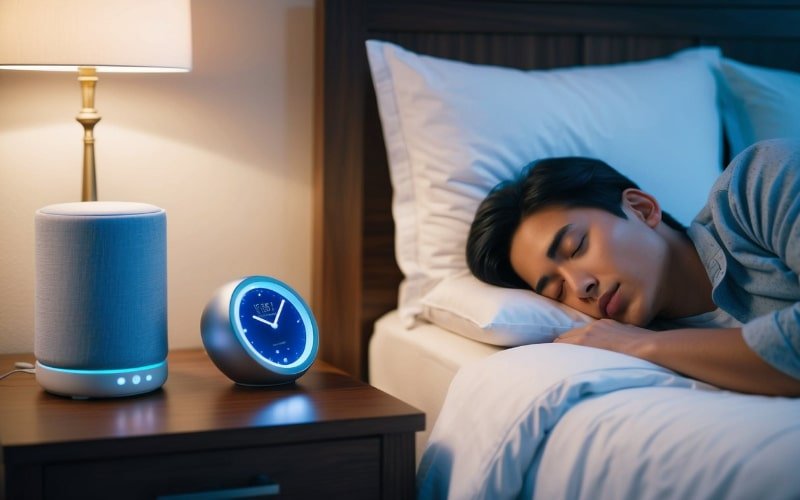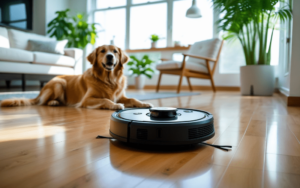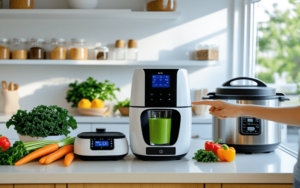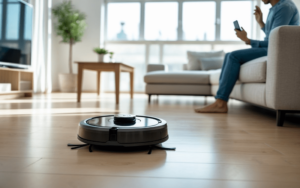In today’s fast-paced world, achieving quality sleep has become a challenge for many.
Technological advancements offer innovative solutions to enhance sleep quality.
Improve your sleep quality with the best smart sleep gadgets. From white noise machines to smart beds, find the best sleep solutions for your home.
Top smart sleep gadgets provide a seamless blend of technology and comfort, enabling users to fall asleep faster and wake up refreshed.
These gadgets include everything from wearable trackers to smart mattresses and climate-control solutions.
For instance, smart mattresses adjust their firmness and temperature based on the user’s preferences, while noise-cancelling earbuds create an ideal sound environment for rest.
As individuals explore these gadgets, they find themselves experiencing improved sleep patterns and overall better rest.
With the right technology, a rejuvenating sleep routine is within reach.
Please note that this article contains affiliate links. As an Amazon Associate, we earn from qualifying purchases at no extra cost to you.
The Importance of Quality Sleep
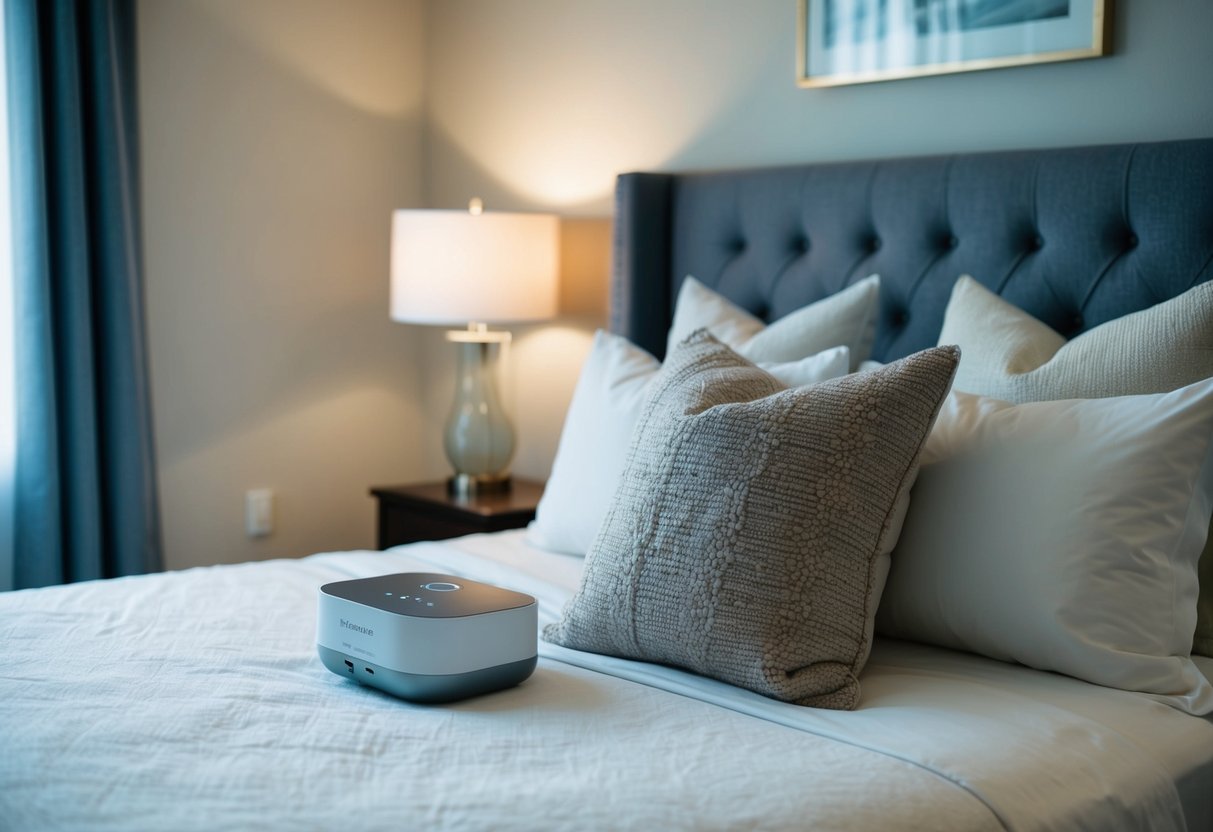
Sleep is vital for physical health. During sleep, the body repairs muscles, consolidates memories, and releases hormones regulating growth and appetite.
Lack of quality sleep is linked to numerous health issues like weakened immunity and increased risk of chronic conditions.
In addition to physical benefits, sleep significantly impacts mental health.
Restful sleep enhances cognitive function, emotional regulation, and decision-making skills.
Conversely, sleep deprivation can result in irritability, increased stress levels, and reduced problem-solving abilities.
Benefits of Quality Sleep:
- Improved Concentration: Enhances focus and cognitive performance.
- Better Mood: Promotes emotional stability and reduces anxiety.
- Increased Energy: Provides sustained energy and endurance throughout the day.
Consequences of Poor Sleep:
- Memory Problems: Hinders the ability to form and retain memories.
- Weight Gain: Disrupts hormones that control hunger, leading to overeating.
- Health Risks: Increases the likelihood of heart disease, diabetes, and hypertension.
By prioritizing sleep, individuals can improve their quality of life, support wellness goals, and maintain optimal mental and physical health.
Understanding the importance of sleep can motivate healthier lifestyle choices and foster long-term well-being.
Revolutionary Smart Sleep Gadgets

Smart beds are no longer just a concept.
They are equipped with features like sleep cycle tracking and climate control, which adjust the bed’s temperature according to the user’s preferences, enhancing comfort and restfulness.
Some smart beds can even adapt firmness levels throughout the night.
Wearable sleep trackers have also evolved significantly, providing more than just sleep duration data.
These devices offer insights into sleep stages and quality, helping users tailor their routines for better rest.
Advanced models include features such as heart rate monitoring and personalized sleep coaching.
We may earn a small commission if you purchase through this link. Thank you for supporting our content!
Sleep earbuds represent a silent revolution in sleep gadgets.
Designed to deliver soothing sounds or white noise, these buds help reduce external disturbances.
They are compact and comfortable, ensuring they stay put throughout the night without causing discomfort.
Smart lighting systems are transforming bedroom environments.
These systems simulate natural light cycles to help regulate sleep-wake patterns.
By gradually dimming lights at night and simulating sunrise in the morning, users can align their sleep schedule more closely with natural rhythms.
Innovative audio solutions include smart speakers and sound machines that play customizable lullabies or ambient sounds.
These are designed to create a relaxing auditory environment, promoting deeper and more restful sleep.
Apps and software are also making strides in sleep technology.
Many offer guided meditations, sleep stories, or personalized tips based on user data.
They aim to improve sleep hygiene and make winding down a smoother, more engaging experience.
Smart Mattresses and Toppers
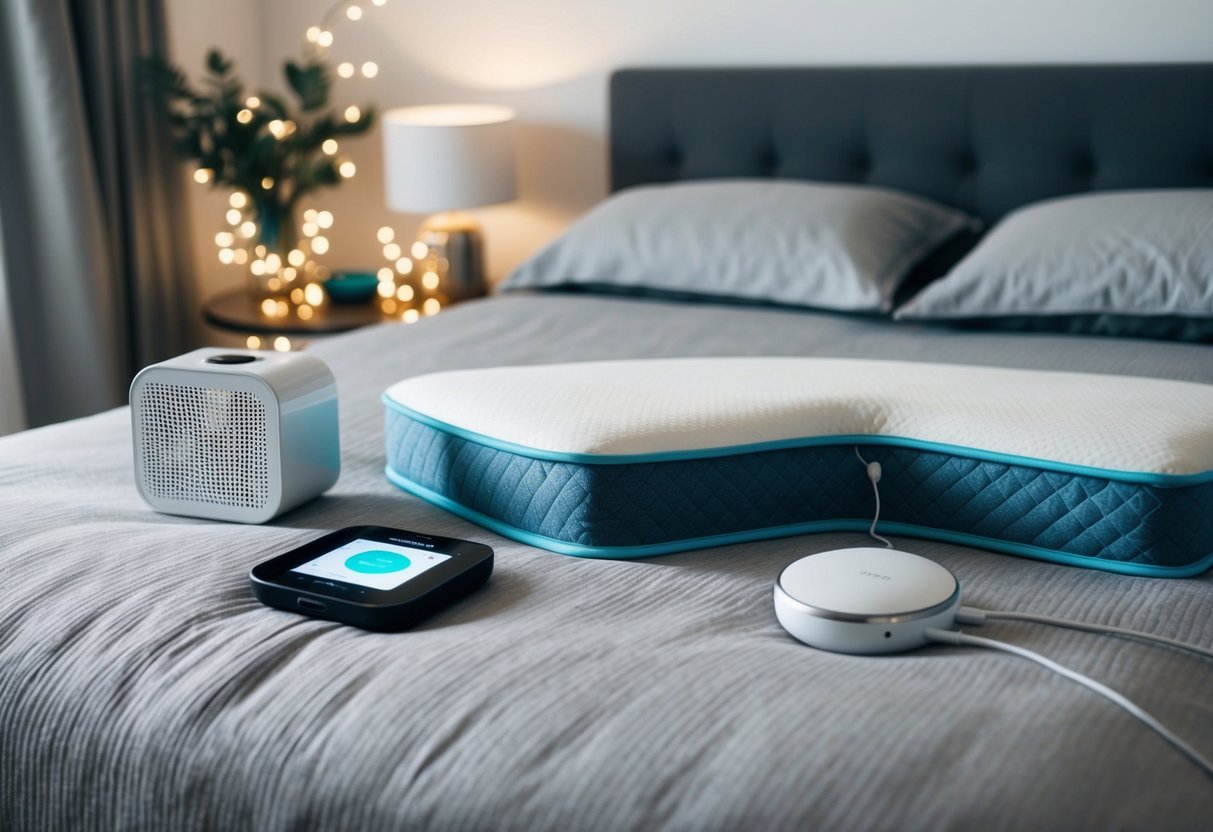
Smart mattresses and toppers have revolutionized sleep technology by offering advanced features like temperature control, sleep tracking, and customizable comfort levels.
These innovations help users achieve restful sleep and wake up feeling refreshed by addressing individual needs.
Temperature Control
Temperature regulation is a key feature of many smart mattresses and toppers.
Certain models incorporate adaptive thermal technology to help maintain an optimal sleep environment.
By adjusting to a sleeper’s body heat, these mattresses can ensure a comfortable night’s rest.
Some products allow users to set specific temperature ranges through a smartphone app.
This can enhance the sleep experience by enabling personalized comfort settings for each side of the bed.
Temperature control helps alleviate night sweats and discomfort, contributing to uninterrupted sleep.
Sleep Tracking Integration
Many smart mattresses now include sleep tracking integration.
This feature provides valuable data on sleep patterns, including duration, stages, and disturbances.
Some models are equipped with sensors that monitor movement, heart rate, and breathing patterns.
This data is transmitted to a dedicated smartphone app.
Users can gain insights into their sleep quality and make informed adjustments to their lifestyle or sleep environment.
Engaging with these analytics helps pinpoint factors that may be disrupting rest, allowing for targeted interventions and ultimately improving sleep quality.
Comfort Customization
Comfort customization allows users to tailor their sleep surface to their preferences.
Smart mattresses often offer adjustable firmness levels through air chambers or specialized support zones.
These options accommodate varying comfort needs, ensuring personalized support throughout the night.
Some toppers offer additional layers of cushioning or support that can be added or removed as desired.
This flexibility means that people with different sleep positions or preferences can find a setup that suits their needs.
Comfort customization is particularly beneficial for couples with distinct comfort preferences, as each person can adjust their side independently, enhancing shared sleep experiences.
Smart Pillows and Blankets
Smart pillows and blankets offer advanced features to enhance sleep quality.
These technologies not only help in reducing snoring but also facilitate a gentle wake-up, which can lead to improved mornings.
Each feature is designed to cater to individual needs, thereby promoting a restful sleep environment.
Snoring Reduction
Smart pillows are often equipped with sensors that detect snoring sounds and sleep patterns.
When snoring is detected, these pillows can subtly shift the position of the user’s head, thus opening airways and reducing or stopping the snoring.
Some smart blankets also offer this feature by adjusting warmth or pressure to encourage a change in position.
Users can often monitor their snoring patterns through companion apps available with these products, which provide valuable insights into their sleep quality over time.
The implementation of such technology in smart pillows and blankets demonstrates their potential to significantly lower snoring incidents, particularly beneficial for those sharing a bed.
Gentle Wake-Up Features
Smart pillows and blankets often integrate gentle wake-up features aimed at providing a more natural transition from sleep to wakefulness.
For instance, smart pillows may utilize gentle vibrations or sounds, simulating a sunrise to gradually wakening the user.
Smart blankets might adjust temperature settings to promote a natural waking process.
These features can help the body adjust from a deep sleep phase, reducing the grogginess often associated with abrupt alarms.
This gentle wake-up mechanism can be customized via associated apps, allowing users to select their preferred sounds, vibration intensity, and timing, ensuring they wake up refreshed and ready to tackle the day.
Wearable Sleep Trackers
Wearable sleep trackers have revolutionized how people monitor their rest.
By collecting data on heart rate and sleep patterns, these devices provide insights that help users improve their sleep habits.
Heart Rate Monitoring
Heart rate monitoring is an essential feature of wearable sleep trackers.
Devices like smart rings and watches continuously track the user’s heart rate throughout the night.
This data helps identify patterns, such as periods of restlessness or deep sleep.
Consistent monitoring of heart rate can offer insights into sleep quality and overall health.
An elevated heart rate may signal stress or discomfort during the night, which can be addressed by adjusting sleep environments or routines.
Detailed graphs and charts available on accompanying apps make it easy for users to interpret heart rate data.
By understanding these metrics, users can make informed decisions to enhance their nightly rest.
Sleep Quality Analysis
Analyzing sleep quality involves examining various parameters to determine how restful one’s sleep is.
Wearable trackers provide information on sleep stages, duration, and disturbances.
Devices like the Oura Ring, praised for its accessible data, are often cited for their precision in this area.
Sleep quality analysis includes metrics such as time spent in REM, light, and deep sleep.
This elucidates whether a user is cycling through necessary stages for restorative rest.
Additionally, trackers often provide personalized feedback or tips based on the collected data, helping users identify factors affecting their sleep quality.
With this knowledge, users can implement changes aimed at improving their sleep cycle and overall health.
Smart Bedroom Environment Controllers
Achieving optimal sleep often requires an environment conducive to rest.
Key elements such as smart lighting, noise control, and temperature regulation can transform a regular bedroom into a haven of relaxation and comfort.
Smart Lighting
Smart lighting systems allow users to control bedroom illumination via mobile apps or voice commands.
These systems often include dimming options and color adjustments.
Philips Hue bulbs, for example, can simulate natural sunlight to help align circadian rhythms.
Users can set schedules to gradually decrease brightness at night or increase it in the morning, enhancing sleep quality.
This feature is beneficial for those who have trouble waking up fully alert.
Such lighting can also integrate with other smart home devices, providing comprehensive control over the bedroom environment.
White Noise Machines
White noise machines help mask disruptive sounds, creating a consistent auditory backdrop.
Devices like the LectroFan offer various sound options, including white noise, pink noise, and fan sounds, to suit different preferences.
These machines can be essential for light sleepers or individuals living in noisy areas.
Many come with sleep timers and volume controls, enabling tailored sound environments.
Some advanced models even use adaptive sound technology to adjust the noise level in response to ambient sounds, maintaining a constant level of masking noise.
Integrating a white noise machine into a bedroom setup can significantly improve sleep duration and depth.
Temperature Regulation
Controlling the bedroom temperature is crucial for quality sleep, as cooler temperatures facilitate deeper sleep cycles.
Devices such as the BedJet system provide personalized climate control through under-sheet air distribution.
Users can adjust settings to match their comfort preferences.
Smart thermostats, like those by Nest, can also be programmed to maintain specific temperatures during sleep hours.
Such products often include features to monitor sleep patterns and adjust temperatures automatically, aiding energy efficiency alongside comfort.
Temperature regulation technology caters to those seeking an optimized sleep environment, improving restfulness and reducing night-time disturbances.
Sleep Apps and Sleep Coaching
Sleep apps have become an essential tool for improving rest and optimizing sleep patterns.
Many of these apps focus on providing insights into sleep quality through detailed tracking features.
By analyzing sleep cycles, users can gain a better understanding of their habits and make necessary adjustments for better rest.
Popular Sleep Apps
Several apps offer unique features tailored to individual needs.
Key Features of Sleep Apps
- Sleep Tracking: Monitor sleep cycles and duration.
- Sleep Analysis: Provide insights into sleep quality.
- Relaxation Techniques: Use sounds and guided meditations.
- Customization: Tailor settings for individual preferences.
Sleep Coaching
In addition to apps, sleep coaching services are gaining popularity. These services offer personalized advice and strategies to tackle specific sleep disorders or improve general sleep hygiene.
Typically delivered through mobile or online platforms, sleep coaching can involve live consultations with experts, providing tailored action plans.
Benefits of Sleep Coaching
- Personalized guidance
- Access to sleep experts
- Actionable sleep improvement strategies
For those interested in exploring the latest in sleep technology, some of the best sleep apps and gadgets of 2025 can be found on websites like Forbes Health and PCMag, which review top options for enhancing rest and sleep quality.
By incorporating these tools into their nighttime routine, users can effectively work towards achieving restful and rejuvenating sleep.
Bedside Sleep Assistants
Bedside sleep assistants can enhance your nightly rest by combining innovative features like smart alarms, voice-controlled operations, and soothing ambient soundscapes.
These devices offer tailored solutions to address various sleep needs, transforming the way individuals experience bedtime and waking up.
Smart Alarms
Smart alarms not only wake individuals up at a specified time but also monitor sleep cycles to determine the optimal time for rousing.
Using sensors or wearable technology, these alarms identify light sleep phases and gently wake users with soft sounds or vibrations.
Devices like the Oura Ring, which is praised for its accuracy in sleep tracking, help achieve this by providing daily slumber stats.
This personalized approach helps users feel more refreshed and reduce the grogginess often associated with traditional alarms.
Features like the gradual increase in light or sound create a more natural waking experience.
Some smart alarms are app-enabled, offering users detailed sleep analysis and recommendations for improving sleep habits.
Voice-Controlled Convenience
Voice-controlled devices bring convenience and comfort to the sleep environment.
Products like smart speakers can be integrated into the bedroom setup, allowing users to control lighting, sound, and other devices with simple voice commands.
This hands-free interaction helps maintain relaxation and ease right before sleep.
For users who wake up frequently at night, voice control provides the ability to adjust settings without the need to physically interact with devices.
By simply speaking a command, users can dim lights or play calming sounds, enhancing the overall sleep environment.
Voice-controlled assistance can help create a personalized bedtime routine that encourages better rest.
Ambient Soundscapes
Ambient soundscapes offer a soothing audio backdrop that can aid sleep by masking disruptive noises.
Devices designed to produce white noise, nature sounds, or calming music can help improve sleep quality.
Many sleep gadgets come equipped with customizable sound settings, allowing users to select the most relaxing audio for their preferences.
These soundscapes can be particularly beneficial for individuals in noisy environments or those dealing with stress and anxiety.
By delivering consistent and relaxing background noise, ambient soundscapes help to create an ideal atmosphere for sleep.
Such features are often integrated into a variety of sleep gadgets, providing an additional layer of comfort and relaxation.
Investing in Tomorrow’s Sleep Technology
Innovation in sleep technology aims to enhance sleep quality through novel gadgets and continuous research. As consumer interest grows, the landscape is shaped by emerging trends and adoption patterns.
Research and Development Trends
Research in sleep technology is increasingly focused on personalization and integration with health data.
Major advancements include devices like the Oura Ring which track sleep patterns alongside daily activity, providing users with tailored feedback.
Innovation extends to smart mattresses that adjust firmness and temperature based on biometric data.
Key players are exploring AI and machine learning to predict sleep disruptions and improve restorative sleep.
Funding in R&D for sleep tech is growing, attracting tech firms and healthcare companies alike.
The emphasis is on non-invasive solutions with high efficacy, drawing interest from investors and healthcare professionals who see potential in preventive healthcare applications and quality of life improvements.
Consumer Adoption Insights
Consumer interest in sleep technology is on the rise, driven by increasing awareness of the importance of sleep health.
Devices like Therabody Sleep Goggles are gaining popularity for their practical solutions to common sleep issues.
Consumers are drawn to products that seamlessly integrate into daily routines and provide tangible benefits.
Market analysis shows a significant portion of adopters are tech-savvy individuals looking for non-pharmaceutical sleep aids.
While early adopters pave the way, broader acceptance hinges on affordability and clear demonstrations of long-term benefits.
As these products become more user-friendly and less intrusive, they are likely to become a staple in households seeking holistic wellness solutions.
Choosing the Right Gadgets for Your Sleep Needs
Selecting the right sleep gadget involves understanding personal needs and preferences.
Some people might benefit from a smart mattress with adjustable firmness, while others might prefer wearable sleep trackers that monitor sleep patterns throughout the night.
These devices, often worn on the wrist, can provide valuable insights into sleep cycles.
They help users adjust their habits to improve rest. Brands like Fitbit and Oura offer popular models with comprehensive data collection.
Smart mattresses can adjust the firmness and temperature to suit individual preferences.
Features such as climate control help maintain optimal sleeping conditions. Companies like Sleep Number and Eight Sleep offer advanced options that promote better rest.
For those who need a quiet environment, noise-cancelling earbuds are a vital option.
They block unwanted sounds, enhancing relaxation. The best sleep tech for 2025 includes high-quality earbuds that cater to this need.
Sleep Apps and Gadgets
Sleep apps and gadgets can play soothing sounds or offer guided meditation.
They encourage relaxation and better sleep hygiene. Engadget lists several effective apps and gadgets aimed at reducing screen time before bed.
This article contains affiliate links, which means we may earn a commission if you purchase through our links, at no extra cost to you. As an Amazon Associate, we earn from qualifying purchases. Thank you for supporting our content!

